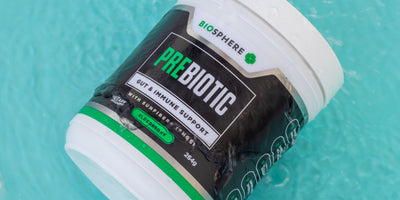
Understanding FODMAPs: How Biosphere Nutrition's Prebiotic Powder Fits In
Introduction
The concept of FODMAPs is transforming the landscape of dietary management for gastrointestinal disorders, especially Irritable Bowel Syndrome (IBS). This guide will explore what FODMAPs are, how they affect the body, and the ways in which a low FODMAP diet can improve digestive health. Additionally, we'll discuss the integration of prebiotic supplements like Biosphere Nutrition's Prebiotic Powder into such a diet, highlighting its potential benefits for maintaining gut health.
FODMAPs can be particularly troublesome for those with sensitive guts, leading to uncomfortable symptoms. Understanding their role and managing their intake can significantly enhance quality of life for many. This article aims to provide comprehensive insights into FODMAPs and offer practical advice for incorporating beneficial dietary changes.
What are FODMAPs?
FODMAPs, standing for Fermentable Oligo-, Di-, Mono-saccharides And Polyols, are a collection of short-chain carbohydrates and sugar alcohols that are not well absorbed by the small intestine. Found in a wide range of foods from onions and garlic to apples and watermelon, these compounds can draw excess water into the gut and produce gas when fermented by bacteria in the colon.
The difficulty in absorbing FODMAPs often leads to increased osmotic activity and rapid fermentation which can cause significant gastrointestinal symptoms such as bloating, gas, stomach pain, diarrhea, and constipation. Understanding which foods contain high levels of FODMAPs is crucial for managing symptoms, especially for individuals suffering from IBS or similar digestive issues.
The Impact of FODMAPs on Digestive Health

When FODMAPs are consumed in large amounts, they can lead to an overload in the colon's capacity to absorb and process these molecules, resulting in discomfort. For those with a sensitive digestive system or conditions like IBS, this can exacerbate symptoms, making dietary management an essential component of treatment.
Scientific studies have shown that FODMAPs contribute to the classic symptoms of digestive distress due to their fermentation and osmotic effects, which increase fluid and gas in the intestines. The discomfort is not just physical; it can also impact mental health and overall quality of life, making effective management strategies critical for sufferers.
Scientific Basis of FODMAP Sensitivity
The gastrointestinal tract's response to FODMAPs is complex, involving both chemical reactions and physical responses. In individuals sensitive to these compounds, the gut's reaction is often exaggerated. This heightened sensitivity is believed to be linked to the gut-brain axis, which plays a crucial role in how pain is perceived and processed by individuals with IBS.
Research indicates that the microbiome's composition— the community of bacteria in the gut—also affects how FODMAPs are handled. Individuals with a microbiome that has a high capacity to ferment FODMAPs may experience more severe symptoms due to greater gas production and water retention in the gut, underscoring the personalised nature of digestive health.
Benefits of a Low FODMAP Diet
Adopting a low FODMAP diet involves reducing the intake of foods rich in these problematic carbohydrates. Clinical trials have consistently shown that this dietary intervention can alleviate symptoms in a significant proportion of IBS sufferers, with many experiencing substantial relief from their chronic symptoms.
Moreover, following a low FODMAP diet can help identify specific dietary triggers, enabling individuals to tailor their long-term eating habits for optimal health. This approach not only manages symptoms but also empowers patients with the knowledge to make informed dietary choices, enhancing their autonomy over their health.
Role of Prebiotics in a Low FODMAP Diet
Prebiotics are dietary fibres that feed the beneficial bacteria in the gut. On a low FODMAP diet, the intake of some prebiotic-rich foods may be reduced, which can affect the overall health of the gut microbiome. Supplementation with a low FODMAP prebiotic, such as Biosphere Nutrition's Prebiotic Powder, can help bridge this gap.
This supplementation supports the growth of beneficial gut bacteria, which is essential for maintaining the integrity of the gut barrier, enhancing immune function, and improving digestive health overall. Prebiotics like those found in Biosphere Nutrition’s Prebiic Powder can serve as a vital component in a low FODMAP diet by compensating for dietary restrictions and ensuring a healthy, balanced gut flora.
Biosphere Nutrition’s Prebiotic Powder: Features and FODMAP Content
Biosphere Nutrition's Prebiotic Powder is specifically designed to support gut health while adhering to the strict low FODMAP dietary guidelines. It is carefully formulated to minimise FODMAP levels, ensuring that it provides the benefits of prebiotics without contributing to the typical digestive discomfort associated with high FODMAP foods.
The prebiotic fibre in Biosphere Nutrition’s supplement is derived from sources that are naturally low in FODMAPs, making it an ideal choice for those managing digestive conditions. This allows individuals to enjoy the benefits of prebiotics—such as improved digestion, enhanced immune function, and better nutrient absorption—without fear of exacerbating their symptoms.
Integrating Biosphere Nutrition’s Prebiotic Powder into a Low FODMAP Diet
Incorporating this prebiotic powder into a daily regimen is straightforward. It can be mixed into various foods or beverages, such as smoothies, oatmeal, or yogurt, providing flexibility in its use. This ease of integration helps maintain the essential fibre intake needed for a healthy gut microbiome, even on a restricted diet.
It’s important to start with a small amount to ensure it suits your gut’s current state, gradually increasing as your tolerance is confirmed. This methodical approach helps prevent any potential discomfort and allows the gut flora to adjust to the new prebiotic source effectively.
Summary
- Definition and Impact of FODMAPs: FODMAPs are short-chain carbohydrates that are poorly absorbed in the small intestine, leading to symptoms like bloating, gas, and pain for those with sensitivities, particularly in conditions like IBS.
- Scientific Basis of Sensitivity: Sensitivity to FODMAPs involves complex gut-brain interactions and microbiome responses that exacerbate digestive symptoms. Understanding this can help tailor individual dietary interventions.
- Advantages of a Low FODMAP Diet: Reducing FODMAP intake has been shown to alleviate gastrointestinal symptoms in up to 75% of IBS patients, improving quality of life by helping identify and manage dietary triggers.
- Role of Prebiotics: While some high FODMAP foods are prebiotic-rich, low FODMAP alternatives like Biosphere Nutrition’s Prebiotic Powder can support gut health without triggering symptoms, balancing the gut microbiome effectively.
- Features of Biosphere Nutrition’s Prebiotic Powder: This supplement is formulated to be low in FODMAPs, making it suitable for those with digestive sensitivities, and it can be easily integrated into a variety of foods and beverages.
Prebiotic Information
For everything you need to know about prebiotics and prebiotic supplements, check out our comprehensive information page here.
Prebiotic
Biosphere Nutrition’s Prebiotic Powder is a unique blend of Sunfiber® and Black Elderberry Extract, designed to nurture gut health and support the immune system. This easy-to-mix, great-tasting formula ensures optimal absorption and digestive comfort. To learn more about our Prebiotic, check out the product page here.







